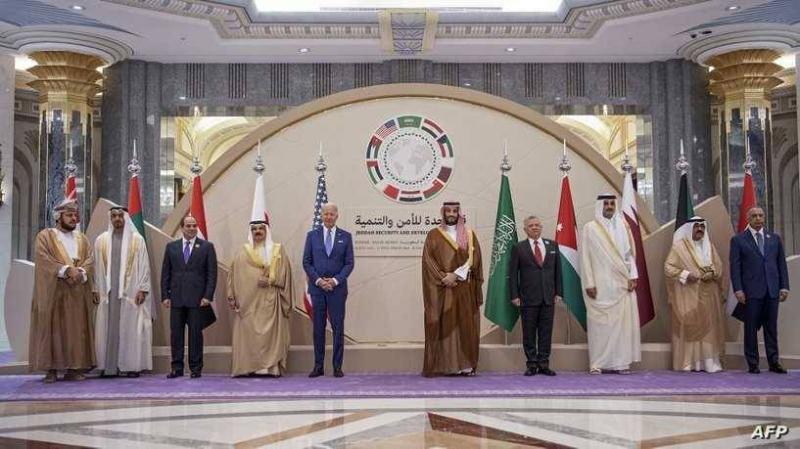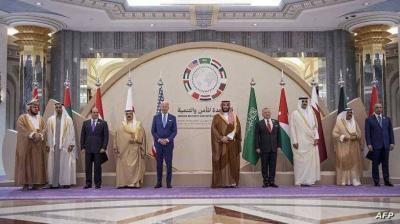It is still a bit early to see the actual and true results of President Joe Biden's visit to Saudi Arabia. Real understandings are not announced in official statements and declared positions. However, there are signals that allow for useful conclusions. The first of these relates to the participation of Iraqi Prime Minister Mustafa Al-Kadhimi, who is seen as a common ground between the Americans and Iranians in Iraq. Logically, Al-Kadhimi must have informed Tehran of the true behind-the-scenes dynamics of the summit. At the same time, Iran and its allies in Iraq did not issue any security reactions that would constitute messages of objection or anger.
The second signal to rely on comes from statements by UAE President Sheikh Mohammed bin Zayed, who announced the imminent return of the UAE ambassador to Tehran. He followed his statement with a public invitation from the American president for an official visit to Washington before the end of this year, suggesting that Washington supports cooling tensions with Iran at this stage. The third signal is Qatar's remarks regarding the right of states to possess nuclear energy for peaceful purposes. The fourth signal comes from Saudi comments inviting Iran to understanding and cooperation.
All these signals suggest that the new axis being formed, which is supposed to be centered around confronting Iran, is currently heading towards de-escalation rather than conflict. A more precise reading indicates that the atmosphere suggests a preemptive arrangement for an American deal with Iran, as evidenced by the American president's remarks, though they were phrased irritatingly, saying that his country would never allow Iran to possess nuclear weapons. Regardless of how this statement is phrased, its content implies that a comprehensive agreement on the nuclear deal is ultimately inevitable. This agreement has stalled because the American administration insisted on not lifting sanctions on the Islamic Revolutionary Guard Corps, specifically Quds Force, which is directly responsible for all of Iran’s proxies in the region.
There has been a prevalent narrative in the Gulf states that claims Iran is a cardboard tiger but has steel claws. This means that while Iran itself suffers from many weaknesses, its sources of power stem from its loyal organizations in the region such as Hezbollah, the Houthis, the Popular Mobilization Forces, and Hamas. Therefore, lifting sanctions on the Quds Force has become off the table, and this issue will not be permitted by the American Congress, especially if predictions indicate a return to Republican control after the midterm elections. This is a reality that Tehran is well aware of and knows that the American administration turns a blind eye to Iranian oil exports through illicit channels and does not act to prevent them because it does not want to go to the ultimate point. Instead, it seeks to smooth over the edges to secure the deal later.
Conversely, Iran's calculations may be focused on possessing an alternative source of strength instead of lifting sanctions on the Quds Force. This source leads to a temporary abstention from going to a nuclear deal under the current conditions as long as it can economically "breathe" by "smuggling" oil sales, thus exploiting the time to reach a stage of nuclear enrichment. At that point, it would have a source of power that allows it to enter the nuclear agreement from a stronger position.
It is, therefore, a matter of time and exhausting options, and perhaps it would be more beneficial to focus on how to arrange the arenas that host Iran's proxies or its "steel claws" and reorganize them in line with the current phase. The American president has bid farewell to phases of wars in the Middle East and, more importantly, announced his commitment to preventing any vacuum in the Middle East that will be filled by China, Russia, and Iran. It is true that the Russian president will visit Tehran; however, there is something even more significant and more indicative that has preceded it, which is his impending visit to Sudan to refuse Moscow's request to establish its first naval base in Africa on the Red Sea, which is one of the world's busiest waterways, accounting for about 30% of global container traffic.
Meanwhile, The Wall Street Journal reported that the Israeli defense minister briefed the American president during their meeting about security agreements Israel has signed with Arab countries that were not part of the Abraham Accords. Biden's announcement that Washington would not withdraw from the Middle East certainly impacts the military domain but also touches the political role, which is the most important point. Since Biden's arrival at the White House, American initiatives in the region have disappeared along with an active and effective role, resulting in a significant vacuum that has led Gulf states to seek a global power to fill it, such as Russia and China. This suggests that American diplomacy will return strongly with new ideas and a driving force towards open arenas like Yemen, Iraq, Syria, and certainly Lebanon, which was given a considerable portion of the final statement, exceeding expectations.
In the diplomatic backstage, there are whispers of an impending American move through diplomatic channels towards Lebanon in a more effective manner. These circles suggest that this movement will be well-coordinated with the French and that the Vatican will be included in its atmosphere. There are two impending deadlines in this context. The first is the completion of maritime border demarcation in the upcoming weeks, especially since most of the existing disputes have been resolved. These circles do not exclude that if an agreement on maritime demarcation is reached, Assistant U.S. Secretary of State for Near Eastern Affairs Barbara Leaf may visit Lebanon to oversee the completion of the maritime border agreement and also to push for the presidential elections that have opened their pages, even though having them on their constitutional schedule remains uncertain.
While Paris, Washington, and the final statement of Biden's visit emphasize the necessity of conducting these elections on time, these calls lack any sanctions that might target those deemed obstructors. Moreover, the significant complexities and difficult calculations surrounding this entitlement do not render it solvable smoothly merely by pressing for its occurence on time. The calculations are deeper, and it is unrealistic to ensure this birth without a preceding political settlement that includes a political and field protocol for the phase of reawakening Lebanon and stabilizing new internal balances. However, signs of a settlement have not yet appeared, raising many questions, and it is supposed to combine "controlling" one of Iran’s most important "steel claws" in exchange for securing the required guarantees and rebuilding trust with the states that will inject money and investments into the arteries of the Lebanese economy, noting that changing the political system in Lebanon is not on the table at all.
In the latest survey conducted by the American Arab Barometer, which included nine Arab countries and involved 23,000 people from October 2021 to April 2022 in partnership with BBC Arabic, Lebanese people consider their current situation to be more pessimistic compared to other countries in the region. They classified their economic situation as significantly worse than any other country, and they appeared to be the least optimistic about their economic future, with only 17% believing it would improve in the coming years, while the percentage ranged from 24% to 61% in all other countries. Trust in the authority is the lowest and significantly differs from other countries, reaching only 8% compared to 25% as the lowest percentage in other countries, some of which are drowning in crises like Tunisia, Sudan, Iraq, Libya, Mauritania, and others. Furthermore, 74% of Lebanese believe that the gap between the rich and the poor is steadily widening. The legal system received only 16% trust, compared to a range of 36% to 61% in other countries. Additionally, 38% of Lebanese think about emigration, an increase of 12 percentage points compared to the same opinion poll in 2018. While 99% of Lebanese consider the economic situation bad, more than half agree that their country needs a leader they can rally around to accomplish things when necessary. The presidential entitlement could be an opportunity in this context.




